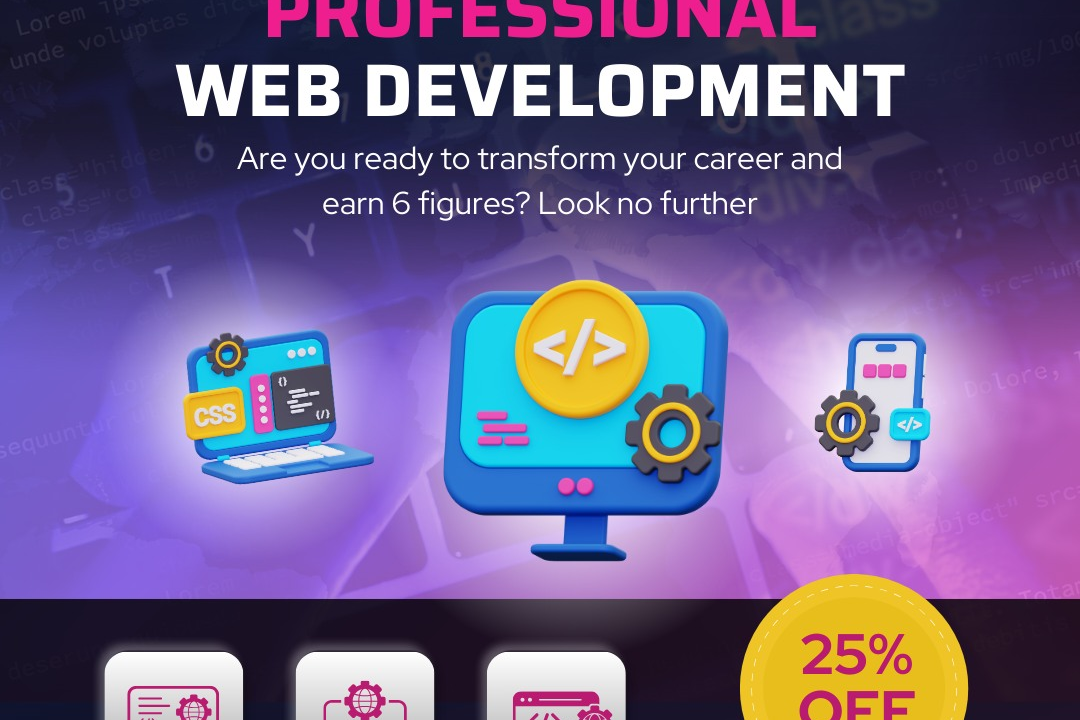GCD Program in PHP
A GCD program in PHP is a script that calculates the greatest common divisor (GCD) of two or more nu
GCD Program in PHP
A GCD program in PHP is an essential tool for performing mathematical computations involving the greatest common divisor of two or more numbers. By efficiently determining the largest number that divides all input values without a remainder, it simplifies fraction calculations, provides foundational support for algorithms in cryptography, and optimizes various number theory operations. Implementing a GCD program in PHP enables developers to handle arithmetic-related tasks accurately and quickly within web applications, enhancing functionality in areas like data analysis, encryption, and mathematical problem-solving.
To Download Our Brochure: https://www.justacademy.co/download-brochure-for-free
Message us for more information: +91 9987184296
A GCD program in PHP is an essential tool for performing mathematical computations involving the greatest common divisor of two or more numbers. By efficiently determining the largest number that divides all input values without a remainder, it simplifies fraction calculations, provides foundational support for algorithms in cryptography, and optimizes various number theory operations. Implementing a GCD program in PHP enables developers to handle arithmetic related tasks accurately and quickly within web applications, enhancing functionality in areas like data analysis, encryption, and mathematical problem solving.
Course Overview
The ‘GCD Program in PHP’ course provides practical training on implementing the Greatest Common Divisor algorithm using PHP. Through real-time projects and step-by-step tutorials, learners will master the concepts of GCD calculation, enhance their PHP programming skills, and understand its applications in various mathematical and cryptographic tasks.
Course Description
Learn to implement the GCD algorithm in PHP with this practical course, featuring real-time projects and step-by-step guidance to strengthen your programming skills and understanding of mathematical computations.
Key Features
1 - Comprehensive Tool Coverage: Provides hands-on training with a range of industry-standard testing tools, including Selenium, JIRA, LoadRunner, and TestRail.
2) Practical Exercises: Features real-world exercises and case studies to apply tools in various testing scenarios.
3) Interactive Learning: Includes interactive sessions with industry experts for personalized feedback and guidance.
4) Detailed Tutorials: Offers extensive tutorials and documentation on tool functionalities and best practices.
5) Advanced Techniques: Covers both fundamental and advanced techniques for using testing tools effectively.
6) Data Visualization: Integrates tools for visualizing test metrics and results, enhancing data interpretation and decision-making.
7) Tool Integration: Teaches how to integrate testing tools into the software development lifecycle for streamlined workflows.
8) Project-Based Learning: Focuses on project-based learning to build practical skills and create a portfolio of completed tasks.
9) Career Support: Provides resources and support for applying learned skills to real-world job scenarios, including resume building and interview preparation.
10) Up-to-Date Content: Ensures that course materials reflect the latest industry standards and tool updates.
Benefits of taking our course
Functional Tools
1 - PHP Development Environment: Students are introduced to setting up a robust PHP development environment using tools like XAMPP, WAMP, or MAMP, which facilitate local server setup, database integration, and easy testing of PHP scripts. These environments provide an integrated platform for writing, debugging, and running PHP code efficiently, ensuring a smooth learning process by simulating real world server configurations.
2) Code Editors and IDEs: The course emphasizes the use of popular code editors such as Visual Studio Code, Sublime Text, or PHPStorm, which offer syntax highlighting, code suggestions, debugging support, and extensions tailored for PHP development. Familiarity with these tools enhances productivity, helps students write clean code, and simplifies troubleshooting during project development.
3) Version Control Systems: Students learn to use Git and platforms like GitHub or GitLab for version control, enabling them to manage code changes systematically, collaborate with peers, and track revisions effectively. These tools are essential for maintaining project integrity, rollback options, and understanding collaborative workflows, mimicking industry standards.
4) Debugging Tools: The program covers debugging tools such as Xdebug integrated with IDEs or standalone debugging plugins, allowing students to identify, analyze, and fix code errors efficiently. Debugging skills are crucial for developing reliable software, and these tools provide real time insights into code execution, variable states, and performance issues.
5) Command Line Interfaces (CLI): Students are introduced to command line tools for PHP scripting and version control, fostering familiarity with terminal commands, scripts execution, and automation. Mastery of CLI enhances control over development processes, scripting efficiency, and prepares students for deployment tasks or environment configuration.
6) Web Browsers and Developer Tools: The course highlights using popular web browsers like Chrome, Firefox, or Edge, along with their developer tools to inspect web page elements, analyze network requests, and debug client side issues. These tools help students understand front end interactions with PHP scripts, ensuring comprehensive debugging capabilities.
7) Database Management Tools: Since the GCD program may involve data storage or retrieval aspects, students are taught to use database management tools like phpMyAdmin or MySQL Workbench. These facilitate database creation, query writing, and data manipulation, providing a full stack understanding of PHP applications.
8) Testing Frameworks: Introduction to basic testing tools like PHPUnit or manual testing approaches enables students to validate their code's correctness. Testing ensures robustness of algorithms like GCD, promotes best practices in software development, and prepares students for writing maintainable code.
9) Documentation Tools: Students learn to use documentation generators or Markdown editors for maintaining clear code documentation, which is vital for project clarity, collaboration, and future maintenance. Proper documentation skills complement technical understanding and professional workflow practices.
10) Deployment Platforms: The course explores deployment options such as shared hosting, cloud platforms like Heroku, or Docker containers, with relevant tools to upload, configure, and run their PHP projects live. Understanding deployment processes prepares students for real world project delivery and client interactions.
11 - Integrated Development Environments (IDEs): The program introduces comprehensive IDEs like PHPStorm and NetBeans, which offer advanced features such as code auto completion, error detection, code refactoring, and integrated debugging. Mastering these environments helps students develop efficient coding habits and manage complex projects seamlessly.
12) API Testing Tools: Students learn to use API testing tools such as Postman or Insomnia to test and interact with RESTful APIs, which are often integrated into PHP applications for functionality expansion. This knowledge enables seamless communication between front end and back end components, essential for dynamic application development.
13) Continuous Integration/Continuous Deployment (CI/CD) Tools: The course covers introductory concepts of CI/CD pipelines using tools like Jenkins, GitHub Actions, or GitLab CI. Implementing automated testing and deployment workflows ensures stable code releases, shortened development cycles, and fosters industry standard practices.
14) Containerization and Virtualization: Students explore containerization tools like Docker, allowing them to package PHP applications along with their dependencies for consistent deployment across different environments. Understanding containerization streamlines the development to production transition and promotes scalable architecture.
15) Performance Profiling Tools: The program introduces profiling tools such as XHProf or New Relic, which help analyze application performance, identify bottlenecks, and optimize code efficiency. These skills are vital for developing high performance PHP applications that can handle real time project demands.
16) Security Tools and Practices: The course emphasizes the use of security testing tools and best practices to protect PHP applications against common vulnerabilities like SQL injection, Cross site scripting (XSS), and CSRF attacks. Awareness of security tools equips students to build safe and reliable web applications.
17) Static Code Analysis Tools: Students learn to utilize static analysis tools such as PHPStan or Psalm to identify potential code issues early, enforce coding standards, and improve code quality. This proactive approach reduces bugs and enhances maintainability in projects.
18) Collaboration Platforms: The program familiarizes students with collaboration tools like Slack, Jira, or Trello for project management, communication, and task tracking. Effective collaboration tools mirror real world team environments, preparing students for professional software development workflows.
19) Data Visualization Tools: Depending on project scope, students may learn to integrate PHP with data visualization libraries or tools like Chart.js or Google Charts for presenting data insights. Visualization skills enhance the presentation and interpretation of project data.
20) Cloud Storage and CDN Integration: The course introduces cloud storage options such as AWS S3 or Google Cloud Storage, along with CDN (Content Delivery Network) integration, to optimize content delivery and scalability for PHP based web applications. These skills are essential for deploying high availability projects in live environments.
21 - Automated Backup and Monitoring Tools: Students explore automated backups using scripts or cloud solutions, along with monitoring tools like Nagios or Datadog, to ensure application stability, data integrity, and quick recovery in case of failures.
22) Code Quality and Style Checkers: The course covers tools like PHP_CodeSniffer and StyleCI to maintain consistent coding styles, improve readability, and ensure adherence to industry standards across team projects.
23) Localization and Internationalization Tools: For global applications, students learn to utilize tools and libraries that support multiple languages and regional formats, broadening the scope and usability of their PHP projects.
24) Unit Testing and Test Automation: The program emphasizes writing unit tests and automating tests to verify individual modules, ensuring robust code and reducing regression bugs during project updates.
25) Real time Collaboration Tools for Remote Development: With the rise of remote work, students familiarize themselves with remote pair programming, live code sharing platforms, and online IDEs like Visual Studio Live Share, promoting effective collaboration regardless of location.
These additional technical tools and practices prepare students not only to develop functional PHP projects but also to excel in professional environments that demand scalability, security, and collaboration.
Browse our course links : https://www.justacademy.co/all-courses
To Join our FREE DEMO Session:
This information is sourced from JustAcademy
Contact Info:
Roshan Chaturvedi
Message us on Whatsapp: +91 9987184296
Email id: info@justacademy.co
How To Initialize Appium Driver Depeing On Ios Or Android












